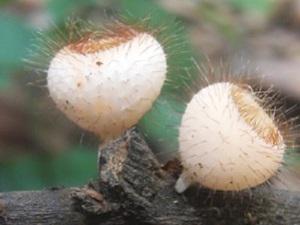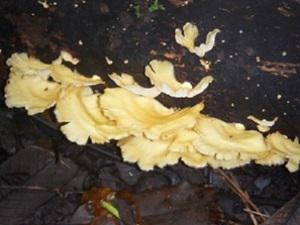Rosemary Tonjock
Other projects
7 May 2010
Conservation and Ethnomycological Studies of Macro-Fungi (Mushrooms) in the Mount Cameroon Region
29 Apr 2013
Establishment of a Genebank Collection for Macro-Fungi of Conservation Importance in the Mount Cameroon Region, and Cultivation Trials of Selected Species
The project is aimed at carrying out extensive diversity, socio-economic surveys and conservation education of macrofungi in the Mount Cameroon Region.
Fungi are one of the most important groups of organisms in terrestrial ecosystems, having a biomass second only to plants, and species diversity second only to the invertebrates. Mushrooms serve as a source of food, beverages, they supply us with pharmaceuticals, traditional medicine, biochemicals and enzymes of enormous value to medicine and industry helps in nutrient cycling through mycorrhiza associations, biocontrol agents and as agents for remediating sites polluted with intractable wastes.

Cookeina sp.
The project seeks to continue with the documentation of the diversity and distribution of macrofungi in the Mount Cameroon Region. This will be achieved through extensive field surveys using the transect methods at low and high altitudes of the Mountain. Macrofungi samples encountered will be photographed in situ, collected and dried. Species identification will be done based on macro- and micro- morphological characters. Extensive socio-economic survey of edible and medicinal species will be done to assess the conservation status. Conservation will be through sensitization of stakeholders on sustainable harvesting, cultivation, and habitat protection amongst others.

Pleurotus flabellatus.
Field surveys will be carried out along the four different flanks of the mountain to generate information that will lead to the production of a check lists and red lists of macrofungi in the Mount Cameroon Region, as well as the spatio-temporal distribution and relative abundance of species. The vital biodiversity baseline information obtained will constitute an important reference for studies in taxonomy, ecology, and other related sciences. The material will also be a fall back data bank for the development of new fungal related product for economic enhancement. The socio-economic surveys will be carryout in major markets in Cameroon to generate information on the relative preference of different species by users, the trade routes of the commercialized species, and the knowledge status of different stakeholders in mushroom exploitation on the conservation of these species. This information is essential for policy formulation on the optimization of exploitation of the economic potentials of macro-fungi as well as the basis for the assessment and development of cultivation techniques as a means of conservation. The surveys will also generate demographic and anthropological information on the stakeholders which is needed in the formulation of sensitization information for conservation. Conservation education will be carried out with local communities using visual and audio-visual media, this will go a long way to promote in situ conservation.